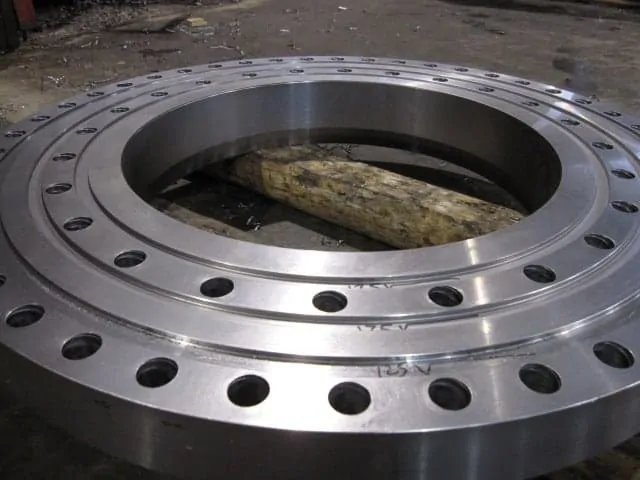Selecting the appropriate material for large diameter flanges is critical for ensuring the performance, durability, and safety of industrial piping systems. The material choice impacts the flange’s ability to withstand various pressures, temperatures, and environmental conditions. This article explores the different materials available for large diameter flanges and provides guidance on selecting the best material for your specific application.
Factors to Consider When Choosing Flange Material
Operating Conditions
Pressure and Temperature: The material must withstand the maximum operating pressure and temperature of the system. High-pressure and high-temperature applications require materials with superior mechanical properties.
Corrosive Environment: If the flange will be exposed to corrosive chemicals, gases, or seawater, choose a material with excellent corrosion resistance.
Mechanical Properties
Strength: The material should have sufficient tensile strength to handle the mechanical stresses in the system.
Toughness: High toughness ensures the material can absorb energy and resist fracture under impact or sudden load changes.
Cost and Availability
Budget: Balance the cost of the material with the performance requirements. Some materials offer excellent properties but come at a higher price.
Supply Chain: Ensure the material is readily available to avoid delays in the manufacturing and delivery of the flanges.
Common Materials for Large Diameter Flanges
Carbon Steel
Carbon steel is widely used due to its high strength and affordability. It is suitable for moderate pressure and temperature conditions.
Applications:
- Oil and gas pipelines
- Water and wastewater treatment
Advantages:
- Cost-Effective: Economical choice for many industrial applications.
- High Strength: Provides robust connections.
Disadvantages:
- Corrosion: Susceptible to rust and corrosion without proper coating or treatment.
Stainless Steel
Stainless steel offers excellent corrosion resistance and is ideal for harsh environments. It is available in various grades, such as 304, 316, and 321.
Applications:
- Chemical processing
- Food and beverage industry
- Marine applications
Advantages:
- Corrosion Resistance: Protects against rust and chemical damage.
- Durability: Long-lasting and low maintenance.
Disadvantages:
- Cost: More expensive than carbon steel.
Alloy Steel
Alloy steel is alloyed with elements like chromium, nickel, and molybdenum to enhance its properties. It is suitable for extreme conditions.
Applications:
- Power generation
- High-temperature services
Advantages:
- Enhanced Properties: Improved strength, toughness, and resistance to wear and corrosion.
- Versatility: Suitable for a wide range of applications.
Disadvantages:
- Cost: Generally more expensive than carbon steel.
Duplex and Super Duplex Stainless Steel
Duplex stainless steels offer a combination of high strength and excellent corrosion resistance. Super duplex stainless steels provide even higher strength and corrosion resistance.
Applications:
- Offshore oil and gas
- Desalination plants
Advantages:
- High Strength: Superior mechanical properties.
- Excellent Corrosion Resistance: Suitable for highly corrosive environments.
Disadvantages:
- Cost: Higher cost compared to standard stainless steels.
Nickel Alloys
Nickel alloys, such as Inconel and Monel, are known for their exceptional resistance to high temperatures and corrosion. They are used in specialized applications.
Applications:
- Aerospace
- Chemical processing
- High-temperature industrial processes
Advantages:
- Temperature Resistance: Maintains integrity at very high temperatures.
- Chemical Resistance: Resistant to a wide range of chemicals and corrosive media.
Disadvantages:
- Cost: Significantly more expensive than other materials.
Material Selection Guide
Assess the Operating Environment
Determine the maximum pressure and temperature the flange will be exposed to. Identify any corrosive substances the flange will come into contact with.
Evaluate Mechanical Requirements
Assess the required strength and toughness based on the application. Consider any potential impact or dynamic loads.
Consider Cost and Availability
Balance performance needs with budget constraints. Ensure the chosen material is readily available to avoid supply chain issues.
Consult with Experts
Seek advice from material scientists or engineers to ensure the best material choice. Review industry standards and specifications for guidance.
FAQs
1. What are the most common materials used for large diameter flanges?
- Common materials include carbon steel, stainless steel, alloy steel, duplex stainless steel, and nickel alloys.
2. Why is stainless steel a preferred material for large diameter flanges?
- Stainless steel offers excellent corrosion resistance and durability, making it ideal for harsh environments.
3. What factors should be considered when choosing flange material?
- Consider operating conditions (pressure, temperature, corrosive environment), mechanical properties (strength, toughness), cost, and availability.
4. How does alloy steel differ from carbon steel?
- Alloy steel is alloyed with elements like chromium, nickel, and molybdenum, enhancing its strength, toughness, and resistance to wear and corrosion compared to carbon steel.
5. Why are nickel alloys used in high-temperature applications?
- Nickel alloys maintain their integrity and resist corrosion at very high temperatures, making them suitable for specialized applications.
6. Can large diameter flanges be customized?
- Yes, they can be customized in terms of material selection, dimensions, pressure ratings, and other specifications to meet specific application needs.
7. What industries commonly use duplex stainless steel flanges?
- Industries such as offshore oil and gas, desalination plants, and chemical processing use duplex stainless steel flanges.
8. How does the cost of stainless steel compare to carbon steel?
- Stainless steel is generally more expensive than carbon steel due to its superior corrosion resistance and durability.
9. What are the advantages of using forged flanges?
- Forged flanges have improved mechanical properties, such as strength and toughness, and a refined grain structure, enhancing their performance.
10. Where can I purchase high-quality large diameter flanges?
- High-quality large diameter flanges can be purchased from reputable suppliers.
Conclusion
Choosing the right material for large diameter flanges is essential for the safety, reliability, and longevity of industrial piping systems. By considering factors such as operating conditions, mechanical properties, cost, and availability, you can select the most suitable material for your application. For high-quality large diameter flanges made from a variety of materials.
